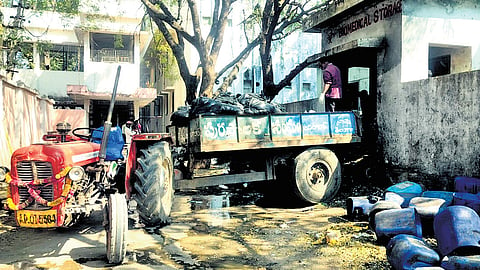

ADILABAD: Irregularities in the collection and disposal of biomedical waste — needles, syringes, saline bottles, pipes, parts of human bodies and foetuses — have been observed in the erstwhile Adilabad district.
Sources pointed out that such waste is often improperly dumped and collected by municipal sanitary workers, posing risks to their health, apart from being harmful to the environment and the health of people living in the vicinity.
Biomedical waste from government and private hospitals is supposed to be systematically collected and incinerated at temperatures ranging from 800°C to 1,200°C. Government hospitals in Nirmal, Mancherial, Bhainsa, Utnoor, Bellampally, Khanapur and Asifabad, along with the Rajiv Gandhi Institute of Medical Sciences (RIMS) in Adilabad and other private hospitals, are expected to adhere to these protocols.
The sources said the Nizamabad Pollution Control Board granted a contract to a single contractor nearly 40 years ago to collect biomedical waste from hospitals in the district and transport it to Nizamabad for incineration. This process involves distances of up to 238 km from Asifabad and 158 km from Adilabad to Nizamabad.
The increasing number of hospitals has raised the volume of biomedical waste. However, municipal staff, lacking proper awareness and training, often collect and dump the waste improperly, leading to environmental pollution and the spread of diseases, the sources said, adding that contractors have also been accused by locals of exploiting the system by irregularly claiming bills and failing to ensure proper transportation and disposal.
Demand for new PCB offices
Given the increase in hospitals and medical facilities, there is a pressing need to expand biomedical waste management units and establish PCB offices in the newly formed districts. Despite holding key positions, former environment ministers, A Indrakaran Reddy and Jogu Ramanna, were unable to establish such offices in the district.
Entrepreneurs interested in setting up new biomedical waste units have alleged a lack of cooperation from authorities, who continue to favour existing contractors instead of encouraging new initiatives that could create employment opportunities, said sources.
They suggest that to address these challenges, the government must establish new biomedical waste management units in each district to reduce transportation distances and ensure timely disposal. It must also increase monitoring by the PCB to ensure adherence to waste disposal protocols, promote entrepreneurship, improve infrastructure, conduct awareness and training programmes for municipal workers to ensure proper waste handling.
Municipal Sanitary Inspector D Narender told TNIE that municipal workers do not handle biomedical waste, as it is transported to Nizamabad in a dedicated vehicle.
Meanwhile, Environmental Engineer G Laxman Prasad noted that the CPCB allocated the responsibility of biomedical waste management to a Nizamabad-based contractor, covering a 150 km radius.